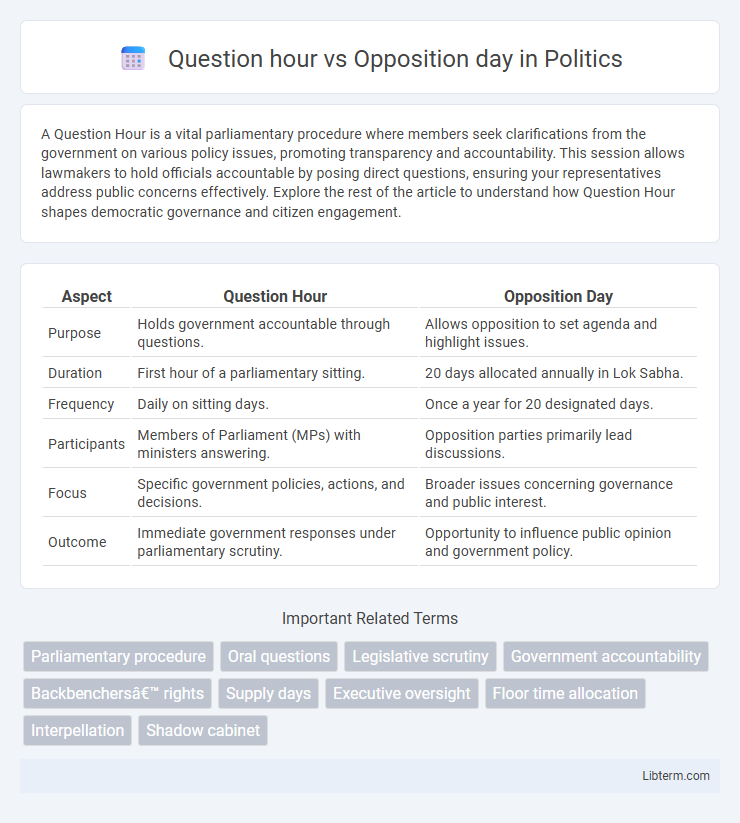A Question Hour is a vital parliamentary procedure where members seek clarifications from the government on various policy issues, promoting transparency and accountability. This session allows lawmakers to hold officials accountable by posing direct questions, ensuring your representatives address public concerns effectively. Explore the rest of the article to understand how Question Hour shapes democratic governance and citizen engagement.
Table of Comparison
| Aspect | Question Hour | Opposition Day |
|---|---|---|
| Purpose | Holds government accountable through questions. | Allows opposition to set agenda and highlight issues. |
| Duration | First hour of a parliamentary sitting. | 20 days allocated annually in Lok Sabha. |
| Frequency | Daily on sitting days. | Once a year for 20 designated days. |
| Participants | Members of Parliament (MPs) with ministers answering. | Opposition parties primarily lead discussions. |
| Focus | Specific government policies, actions, and decisions. | Broader issues concerning governance and public interest. |
| Outcome | Immediate government responses under parliamentary scrutiny. | Opportunity to influence public opinion and government policy. |
Understanding Question Hour: Purpose and Function
Question Hour serves as a critical mechanism in parliamentary proceedings, allowing members to seek information from the government and hold it accountable. This session fosters transparency by enabling direct questioning of ministers regarding policy decisions and administrative actions. The primary function of Question Hour is to ensure government responsiveness and facilitate informed debate within the legislature.
The Origins of Opposition Day
Opposition Day originated in the UK Parliament as a procedural device allowing non-government parties to set the agenda and debate issues of their choice, providing a formal opportunity to challenge the ruling party outside regular Question Hour sessions. Established in the early 20th century, Opposition Day reflects the evolving democratic principle that the minority must actively scrutinize and influence government policies. This practice has since been adopted and adapted by various parliamentary democracies to enhance political accountability and opposition participation.
Key Differences Between Question Hour and Opposition Day
Question Hour primarily serves as a platform for members of parliament to question government ministers about their policies and administration, promoting transparency and accountability. Opposition Day, on the other hand, is exclusively set aside for the opposition parties to raise specific issues and put forth motions, enabling them to challenge government decisions and highlight alternative viewpoints. The key difference lies in their purpose: Question Hour facilitates detailed scrutiny of government actions, while Opposition Day focuses on political debate and agenda-setting by the opposition.
Parliamentary Accountability: Roles of Each Mechanism
Question Hour enhances parliamentary accountability by enabling Members of Parliament to directly question ministers on government actions, ensuring timely clarification of policies and administrative decisions. Opposition Day allows the opposition to set the agenda, focusing parliamentary debates on critical issues to hold the ruling party accountable and highlight alternative policies. Together, these mechanisms promote transparency and responsiveness in governance through structured scrutiny of executive actions.
How Question Hour Enhances Government Transparency
Question Hour plays a critical role in enhancing government transparency by providing Members of Parliament a dedicated time to directly question ministers about policies, decisions, and administrative actions. This parliamentary procedure ensures accountability by publicly scrutinizing government activities and revealing information that might otherwise remain undisclosed. Continuous exposure during Question Hour fosters informed decision-making among elected representatives and keeps the public informed about governmental functioning.
Importance of Opposition Day for Minority Voices
Opposition Day holds significant importance for minority voices as it provides opposition parties with a dedicated platform to raise issues often overlooked during Question Hour. Unlike Question Hour, which primarily allows government accountability through questions, Opposition Day empowers minority parties to set the agenda and highlight specific concerns impacting diverse communities. This ensures balanced representation in legislative discussions and strengthens democratic discourse.
Procedural Rules Governing Question Hour and Opposition Day
Question Hour in Parliament is governed by strict procedural rules mandating daily sessions where members ask ministers questions, adhering to time limits and relevance criteria to ensure effective government accountability. Opposition Day procedures allocate specific days for opposition parties to set the agenda and discuss issues, with rules regulating notice periods, topics discussed, and priority in debate allocation. Both frameworks emphasize structured parliamentary conduct to promote transparency and robust legislative scrutiny.
Comparative Impact on Legislative Agendas
Question Hour serves as a critical platform for immediate scrutiny of government policies, enabling lawmakers to seek clarifications and hold ministers accountable on current issues. Opposition Day allows the opposition to set the agenda, prioritizing topics that challenge government decisions and influence public discourse more strategically. The dynamic between these mechanisms shapes legislative priorities by balancing real-time government accountability with broader political debate and agenda-setting power.
Challenges and Criticisms of Both Practices
Question Hour often faces criticism for being a scripted exercise where members read prepared questions, limiting genuine accountability and comprehensive scrutiny of government actions. Opposition Day debates can devolve into politicized grandstanding with limited impact on policy, reducing them to platforms for partisan point-scoring rather than substantive discussion. Both practices struggle with time constraints and lack of enforcement, hindering effective oversight and meaningful parliamentary engagement.
Evolving Trends in Question Hour and Opposition Day
Question Hour in parliamentary sessions increasingly emphasizes the use of digital platforms and real-time data access, enabling more transparent and efficient scrutiny of government actions. Opposition Day has evolved as a strategic tool for minority parties to highlight pressing national issues, often leveraging media coverage to amplify public debates. Both practices reflect a broader trend towards enhanced accountability and active political engagement within democratic frameworks.
Question hour Infographic

 libterm.com
libterm.com